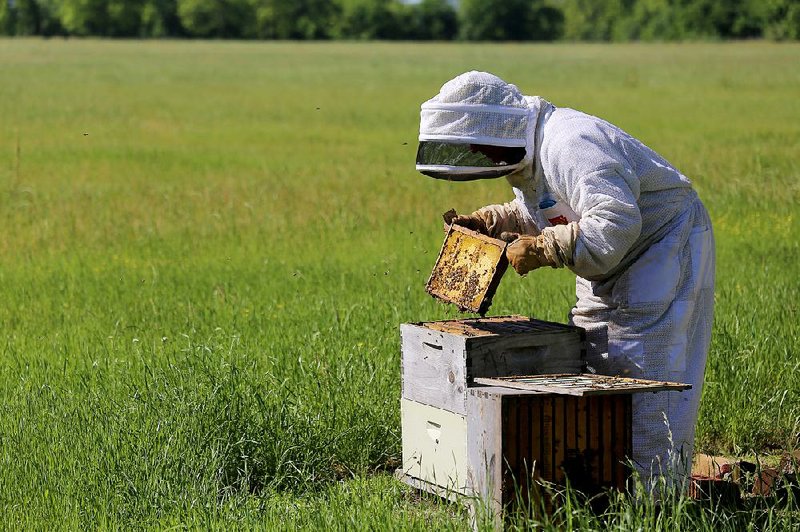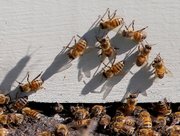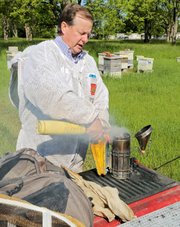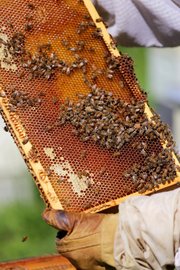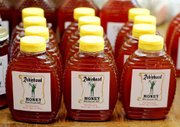When Peter Stuckey decided to jump into the beekeeping hobby, he encountered a little resistance from a neighbor -- and the mailman.
RELATED ARTICLES
http://www.arkansas…">Courses in beekeeping teach hive harvesting http://www.arkansas…">Helpful hints about bees
"[My neighbor] told the mailman and he wouldn't deliver my mail for a week!" Stuckey says with a laugh.
That's not an uncommon reaction when a neighbor or family member shows an interest in keeping bees. Bees mean stings. Sure, bees also mean honey, but for many people, sting trumps honey.
It's actually a misconception about honeybees, according to Jon Zawislak with the University of Arkansas Cooperative Extension Service.
"Honeybees are really very gentle creatures as long as they're given a little bit of space," he says. "Bees are not aggressive but they can be defensive."
Step on a bee, swat a bee or threaten their hive and they may sting, but for them, it's a last resort. Since the honeybee's stinger is attached to the bee's abdomen, the bee dies soon after stinging.
While Stuckey admits he has been stung "a few times," he insists, "It's not that bad. I find bees to be very gentle."
Sting incidents should decrease with confidence and confidence comes with experience. Zawislak says new beekeepers tend to be timid for fear of hurting the bees or having an accident.
"If they have proper equipment and have good training and they know how to approach a bee hive and work with bees, it's not difficult and it's not dangerous for themselves or their neighbors or those around them."
Besides, the rewards are sweet.
Zawislak explains that fresh honey is "just amazing."
"I like to compare fresh local honey to a homegrown tomato versus a supermarket tomato you might buy in December. It has nothing to do with that homegrown tomato you grew in your own garden in the summer. Honey is like that, too."
It's also unique, each batch of honey taking on its own flavor and color depending upon the plants the bees have foraged.
Ronnie Graham has been beekeeping for only five years but what started as a fun hobby has bloomed, thanks to the demand for honey, into a small business of sorts with nearly 40 hives.
"People keep coming up to you wanting more honey and you're like, 'I've got to get more bees!'"
Helping Hives
A supply of home-produced honey is just one of the enticements that draw people to beekeeping, a hobby that has seen an uptick in activity in recent years, Zawislak says.
Corinne Smith and her husband, John, have owned Central Beekeepers Supply in Russellville since 2011 and in those five years, she says, "Our business has grown tremendously. We never anticipated this."
Many people picking up the hobby are drawn by a desire to do their part for the environment, called to action by news reports and documentaries about colony collapse disorder, in which a colony's workers disappear, and the threat to honeybee populations in the United States.
That was the case for Stuckey, whose longtime interest was pushed over the edge by news reports.
"That kind of drove me to say, 'Well, I'd like to do my little part, what I can to help this situation.'"
That urge to do one's part matches the growing "urban homestead" movement, characterized by an increase in city dwellers who grow food and raise chickens.
Zawislak says, "People are getting into gardening [and] egg production with chickens. Honeybees are an easy part of that because bees don't take up much room. They can produce a significant crop of honey in a very small space."
One doesn't even need a yard. Bees forage up to three miles from their hive, so all a beekeeper needs is space for a small hive and the bees will spread out accordingly.
That roaming tendency brings benefits for everyone within three miles of the hives, since those bees are pollinating everyone else's yards, gardens and orchards.
For some people, the draw is more personal. Smith and Emily Bemis of Bemis Tree Farm say that many of their customers are people whose parents or grandparents were beekeepers.
That's how Smith and her husband got started. Her father-in-law kept bees most of his life until he had a stroke in 2011.
"My husband said, 'Can't let the hives go.'"
So, they took over. Now, they have 30-40 hives and in addition to the supply business, they sell their honey locally by word of mouth.
Getting Started
The bee supply business at Bemis Tree Farm south of downtown Little Rock started as a way to help others. Emily Bemis explains that when her husband wanted to get into beekeeping four years ago, "we didn't know what to do. [There was] nowhere around here locally to buy anything."
So now, they sell the supplies and offer classes themselves.
"We're just trying to help people get started a little easier than we got started."
There are books on beekeeping and there are sites full of information on the internet, but there is also some faulty information out there and having a personal mentor or support group can make a world of difference.
Bemis says, "It's not difficult but it can be difficult if you don't really know what you're doing or have anyone to walk you through it. Knowledge is crucial in beekeeping."
It's also not a cheap hobby. There is a lot of equipment involved and Zawislak, Smith and Bemis recommend buying good quality equipment. Depending on the type of kit, it may include protective clothing, feeders and jars, smoker and the hive with its components and can cost several hundred dollars. At Bemis Tree Farm, a basic beginner bee kit that comes with only the basic hive components, painted and assembled, costs $250 ($170 if you assemble and paint it yourself).
But, Corinne Smith points out, "It's upfront cost. The good thing is, after you buy your equipment, it's going to last 10 to 15 years."
And then there are the bees, which Zawislak says "are in high demand and short supply."
In central Arkansas, Bemis Tree Farm sells bees on a pre-order system starting in December or January at $130 for 3 pounds of bees with a queen. That translates to 10,000-12,000 bees, or one hive's worth. There are also ways to order them online, but be warned that bees have been known to die en route.
There are rules and ordinances to follow when starting a beekeeping hobby. Laws vary by city. In Little Rock, residents are allowed to have two hives per city lot. Different communities have different rules. In March, Searcy City Council declared the city the first "pollinator friendly city" in Arkansas. The ordinance calls for a committee to guide the community in encouraging pollination and making the city pollinator-friendly.
PUTTING IN THE TIME
There are some people who decide to get involved in beekeeping and simply buy the bees, put them in a hive and leave them alone.
"People wouldn't buy any other type of livestock or even a pet and then never look at it or never touch it again," Zawislak says. "But people tend to do that with bees."
And as Graham has discovered, bees have minds of their own and even when the beekeeper does everything right, the hive can still take off or a queen can take her own time getting in the mood for mating.
For Stuckey, the problem isn't so much the bees demanding time as he wanting to give them all his time, watching them at work, monitoring their health and progress, harvesting the honey.
"I want to spend time with my bees because it's so fun. Other things I need to do get put aside so I can work with my bees."
Smith says, "Beekeeping is one thing that will keep your attention more than anything else. It's so in-depth. You can start on a really basic level and the more you learn about it, the more amazing and interesting they are. It's amazing to sit and watch them."
Sweetening the Sting
As fascinating as bees are, they still cause a visceral, fearful reaction in many and some would-be beekeepers find their efforts stymied by neighbors with visions of vicious swarms invading their yards.
Bemis says, "We've got a lot of customers who have problems putting bee hives on their property and their neighbors will get upset thinking they're going to get stung. They don't want to start a war with their neighbors so they're holding off."
And yet, given some time and education, neighbor resistance is not an insurmountable problem. Especially with a little incentive.
Graham says he chose not to tell his neighbors at first, keeping his hives hidden by his tall fence until the neighborhood Christmas gift exchange when he handed out jars of honey.
"I told them, 'I've had bees in my backyard for a year now and they haven't bothered anybody or anything and here's the honey from it.' They were really surprised!"
As for Stuckey's mailman and neighbor, the whole situation was ironed out and Stuckey did start receiving his mail.
As for the neighbor, "She gets a jar of honey every year now for free and she's quite happy with it."
HomeStyle on 05/14/2016
